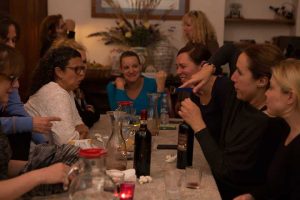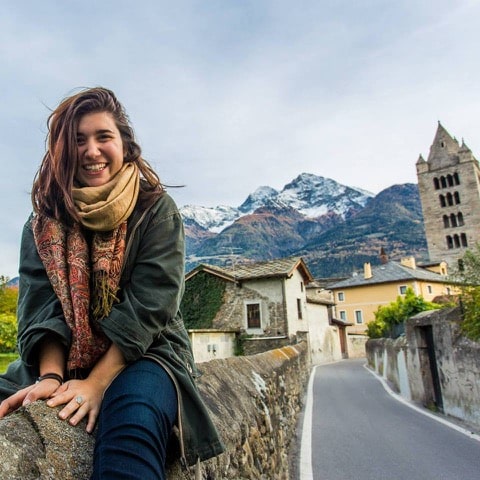Note from Jen Pastiloff, founder of The Manifest-Station. This is part of our Young Voices Series for Girl Power: You Are Enough. We are always looking for more writing from YOU! Make sure you follow us on instagram at @GirlPowerYouAreEnough and on Facebook here.
By Raisa Imogen
For a long time, when people asked me what I wanted to be when I grew up, I said I wanted to be happy. This seemed like a distant and shimmering answer, and something people couldn’t question. If I said I wanted to be a writer, people would ask me, rapid fire: What kind of writing? Do you want to go to grad school? That’s nice, but I meant what are you going to do for money? Saying I wanted to be happy could mean writing, or it could mean a white picket fence in the suburbs, or traveling the world, or eating granola in my bed. Whatever was underneath “happy,” it remained mine, and no one could question it.
I’ve spent this year studying abroad in Italy. It’s been a whirlwind of churches, fruit stands, and little old women dressed to the nines. I’ve lit a paper lantern and let it go across the Adriatic Sea. I’ve been invited in for coffee by a nun. I’ve walked through the underground city of Naples.
I was also in Paris during the terrorist attacks. I got bed bugs in Rome. I went through a breakup. I do not mean to present the highs and the lows as a balanced equation (I am well aware it would be a very, very privileged equation). I mean only to point to a few moments to say I have experienced extremes.
A year ago in my university’s newspaper, I wrote, “I conquered an eating disorder.” What I meant was that I didn’t use the margins of my notebooks to tally calories anymore. I could live with myself on the days I didn’t run six miles. I could eat an entire slice of cake on my birthday without wincing.
What I should have said was: I conquered an eating disorder once.
After Paris, I was anxious, all the time. I ate cartons of cereal instead of actually feeling sad. When I went grocery shopping, I bounced back and forth between milk brands and brightly stacked vegetables, disoriented, as if on a scavenger hunt without any clues. In between all of this, I was drinking espresso in Venice, watching sunsets, and coasting through the hills of Bologna on a Vespa.
I had little to no patience with myself- if I wasn’t happy now, in Italy, when would I be? How could I be re-facing an eating disorder when I had so many days here where I was not just happy but ecstatic, and overcome with gratitude?
You’d think re-facing something means that it would be a little easier to look in the eye. But this version of an eating disorder is different from the one I experienced at sixteen. It is both deeply familiar and also completely foreign. I have had to re-learn it. I have had to carve a new space.
Shame is what pulls you under. When my mom came to visit me in Italy, I said, I’m still struggling. Sometimes I’m scared. It was strange to be having this conversation in a hotel in Italy, a better version of the conversation we’d had four years ago in our living room in Chicago.
At the end of it, my mother said: I just want you to be happy. The sentiment was beautiful! Who doesn’t want to be happy? Who doesn’t want their parents to want that for them? For the record, my mother is incredible. But I was mad as hell. There is something unsatisfying and hollow about the word happiness. It’s impossible to pin down. It doesn’t capture much.
And yet, a big part of me wanted to say, “But I am happy.” It wasn’t a lie. Overall, I didn’t not feel happy, even while during the conversation I was crying and my face was covered in snot.
My mother wasn’t wrong in perhaps referencing the fact that I didn’t seem at peace. But why did I feel shame at admitting things were sometimes not so easy? Why was it so hard to admit that yes, I wasn’t always happy?
I think we are taught that happy means good and sad means bad. But in the Welsh language, the word “happy” first meant “wise.” “Satisfaction” comes from the same Indo-European root that gives us “sad.” Disorder, of whatever type, can co-exist with “goodness,” and illness can co-exist with health. Maybe some difficult things never go away, but we learn how to re-greet them, to pay attention, to maybe be a little bit more compassionate towards ourselves. Contradictions don’t equate to lies or hypocrisies. We can be kickass students, amazing friends, artists, athletes, parents, and partners, and within the context of being those things, we can struggle with what is painful, dark and difficult.
As the Italians say, Non ha il dolce a caro, chi provato non ha l’amaro. To taste the sweet, sometimes you must try the bitter. Meaning, you can have moments of light in a year of suffering, or moments of suffering in a year of light. You can wake up in Italy, or Spain, or Senegal or Chicago (or wherever you are) and see something painful rise within you, something you thought you left behind many places ago. Hardship, in however it manifests, can be a part of well-being.
We can be in awe of the world around us (and active participants) while also deeply in pain. Bearing witness to ourselves and all of our contradictions, learning to greet (often more than once) our struggles with compassion, and allowing room for pain is, sometimes, a lot of work. A lot of hard work, and often excruciatingly difficult. But it is worthwhile, and important, and worth stopping in the midst of our very busy lives to make space for and observe.
Raisa Imogen was born in Portland, Oregon, grew up in Chicago, and is currently studying at the University of Bologna in Italy. Her poetry can be found at www.raisaimogen.net and at The Kenyon Review.


